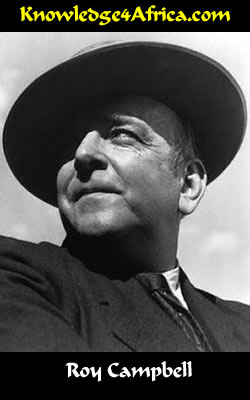|
READ THIS
The poet describes a herd of zebra which he sees on the grasslands at dawn. He is enraptured by their
stark beauty as they roam the land freely, and then as a stallion romps with a filly.
 NOTE ON THE POET
NOTE ON THE POET
Roy Campbell was born in Durban in 1901 and was at one stage considered to be one of South Africa's
best poets. His popularity, however, has waned in recent years so that today his poetry is hardly ever
read.
Educated at Durban High School, he spent much of his youth in the great outdoors -- something that is
reflected in many of his poems like "The Zebras". As soon as the Great War was over, however,
he moved to England where he attended Oxford University.
He married Mary Garman, a marriage which did not carry his parents' consent and therefore meant that,
for a time at least, Campbell was struck off from his inheritance. He had two daughters by this marriage.
In 1925, he returned to South Africa and founded a literary magazine called Voorslag which was
meant to promote cultural development amongst the Afrikaners whom the poet regarded as backward and
uncouth.
Very soon disillusionment set in, however, and he returned to England. His disillusionment continued even
there as he fell foul of his own fellow poets -- and even of his wife whom he found was not averse to
lesbian affairs.
During the early 1930s he settled in the Provence region of France -- the scene for one of his greatest
poems, "Horses on the Camargue". During this time he was slowly drawn to Catholicism and
drunkenness.
In the mid-1930s, due to a loss in a civil lawsuit, the Campbell family fled to Spain where the poet became
an avid supporter of the fascist dictator, General Franco. It was this support which saw the poet's
reputation slump amongst his literary colleagues.
When World War II broke out, the poet moved back to England and enlisted for military duty. It was
during those years that he became close friends with the Welsh poet and fellow drunkard, Dylan Thomas.
After the war, the poet returned to the Iberian Peninsula but this time settled in Portugal. He died in a car
accident over the Easter weekend of 1957.
Have you looked at the questions
in the right column?
|
TEST YOURSELF!
Read the left column and then answer
the following questions:
From the dark woods that breathe of fallen showers,
Harnessed with level rays in golden reins,
The zebras draw the dawn across the plains.
- What evidence from the poem indicates that it has recently rained? (2)

[Need help?]
The poem speaks of the woods "that breathe of fallen showers". In other words, it has recently
rained and the odour of the rain still permeates the woods.
|
- What evidence is there that it is no longer raining? (2)

[Need help?]
The sun is shining and its "level rays" light up the plains.
|

[Need help?]
A harness is the gear or tackle that is placed over a horse's head and body -- or on any other draft
animal, for that matter -- to enable one to ride it or to enable one to use the animal for pulling something.
|

[Need help?]
A rein is a leather strap which is fastened to a bit and bridle, by which the rider or driver controls a horse
or other animal.
|
- How do you know that the sun has only recently risen? (2)

[Need help?]
The poem speaks of the "level rays", which means that the sun is just peaking over the horizon so
that its rays are still parallel to the ground.
|
- Explain the meaning of the word "plains". (2)

[Need help?]
The "plains" are the open grasslands or savannah, which is mostly flat or undulating.
|
The sunlight, zithering their flanks with fire,
Flashes between the shadows as they pass
Barred with electric tremors through the grass
Like wind along the gold strings of a lyre.

[Need help?]
A zither is a musical instrument consisting of a flat box and strings -- not unlike a guitar -- that is played
with one's fingers or with a plectrum.
|
- In what way could the sunlight be "zithering their flanks with fire"? (4)

[Need help?]
The poet is comparing the stripes on the zebras to the strings of the zither. The zither makes pleasant
music with its strings, while the zebra makes metaphorical music with its stripes.
The sun is "zithering their flanks with fire" because the white stripes are orange in colour in the
orange dawn sunlight.
|
- What exactly is it that "flashes between the shadows as they pass"? (4)

[Need help?]
It is the sunlight that "flashes between the shadows as they pass".
In other words, the sun has just risen above the horizon and so its rays are level with the ground. As the
zebras pass by and cut off the rays of the sun, each body appears dark in silhouette like a shadow, but
the sun flashes out from behind it as the animal moves on, or flashes from between their legs.
|

[Need help?]
A lyre is a stringed instrument of the harp family.
|
|



